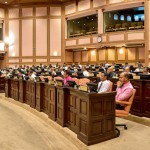The Maldivian Democratic Party (MDP) has declared its intention to protest against the governments flagship special economic zone (SEZ) legislation, warning that passing the bill would pose serious dangers to the Maldives.
“We note that the bill on special economic zones in its current form would allow the government to conduct transactions broadly with no transparency and no opportunity for oversight, as a result of which the possibility of losing the country’s independence and sovereignty would be high,” read a press release from the main opposition party yesterday.
The government, however, maintains that SEZs with relaxed regulations and tax incentives were necessary both for foreign investors to choose the Maldives over other developing nations and to launch ‘mega projects.’
The MDP noted that its lawmakers along with Jumhooree Party (JP) MPs boycotted the economic affairs committee yesterday – which was in the process of reviewing the draft legislation – in protest of procedural violations by the committee’s chair and “dictatorial” actions of pro-government MPs.
MDP and JP MPs also objected to the economic committee allegedly disregarding recommendations and commentary on the bill sent by various state institutions.
Reflecting its combined 48 seats in the 85-member house, the ruling Progressive Party of Maldives and coalition partner Maldives Development Alliance have voting majorities on key parliamentary oversight committees.
After walking out of a committee meeting yesterday, JP Leader Gasim Ibrahim warned that an SEZ law would facilitate massive corruption, threaten independence, and authorise a board formed by the president “to sell off the entire country in the name of economic zones.”
Incentives
The MDP press release warned that an SEZ law would allow the government to bypass local councils, declare any region an economic zone, and lease land for any period.
The law would undermine the Decentralisation Act and restrict the authority granted by the constitution for local councils to “raise funds,” “own property and incur liabilities,” the party contended.
Geographic areas declared an SEZ would be removed from the jurisdiction of local councils.
However, Tourism Minister Ahmed Adeeb told Minivan News in June that an SEZ law would encourage further development of tourism outside of the central atolls or the ‘sea plane zone’ – referring to the proximity from Malé’s international airport – and assured that councils would be consulted.
“I believe that by doing the SEZ Act, we will bring the investment to these regions and this is the real decentralisation of investments,” he said.
The MDP also expressed concern with the tax breaks offered to investors in SEZs, which it argued would limit opportunities for small and medium-sized enterprises.
Concessions in the current draft include tax exemptions and relaxed regulations for employing foreign labour.
Investors would be exempted from paying either import duties for capital goods or business profit tax, goods and services tax and withholding tax for a period of 10 years.
Regulations on foreign workers would be relaxed while companies with foreign shareholders would be allowed to purchase land without paying privatisation fees or sales tax.
Article 74 meanwhile allows up to 40 percent of any zone to be tourist-related development with tax and duty exemptions.
Moreover, private airports and seaports in the zones would be outside the jurisdiction of the Maldives Customs Service.
The enactment of an SEZ law would pave the way for “dangerous and serious crimes,” the MDP press statement continued, such as drug trafficking, money laundering, and human trafficking.
“Castles in the air”
Former President Mohamed Nasheed had dubbed the legislation the ‘Artur Brothers bill’, referring to an infamous pair of Armenians linked with money laundering and drug trafficking who made headlines last year after they were photographed with cabinet ministers.
Nasheed has also dismissed SEZs and the touted mega projects as “castles in the air.”
Referring to the opposition to his administration’s public-private partnership projects on religious and nationalistic grounds – with opposition parties accusing the government of “selling off state assets” – in a speech at an MDP event on Tuesday night (August 12), Nasheed argued that the current administration’s economic policies were far worse judging by their terms.
“There could be no bigger deception of the Maldivian people,” he said.
Nasheed also contended that Maldivian law would not be enforced in the SEZs, claiming that gambling would be allowed in the zones.
President Abdulla Yameen meanwhile insisted in a speech on Monday night (August 11) that foreign investments in the zones posed no threat to Islam or Maldivian sovereignty, assuring that the businesses would be fully subject to Maldivian law.
The government’s objective was “economic transformation” through diversification – to mitigate the reliance on the tourism industry – and shifting the economy from its “present production frontier” to a higher level, Yameen explained.
Yameen had declared in April that the SEZ bill would become “a landmark law” that would strengthen the country’s foreign investment regime.






what is this?